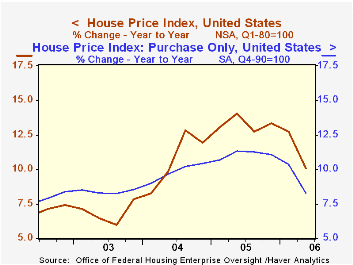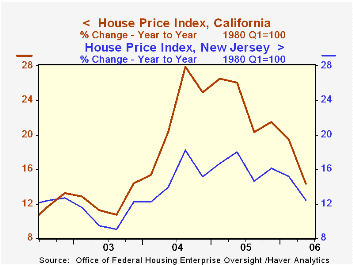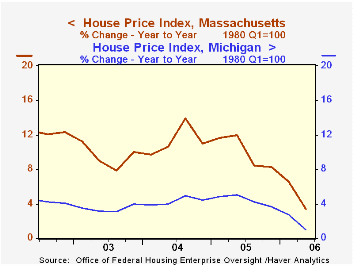 Global| Sep 05 2006
Global| Sep 05 2006Home Prices: Sporadic Regional Declines
by:Tom Moeller
|in:Economy in Brief
Summary
The Office of Federal Housing Enterprise Oversight (OFHEO) reported that during 2Q '06, home prices rose 1.2% q/q and that it was the slowest gain since 4Q '99. The OFHEO house price index is a geometric weighted average based on more [...]

The Office of Federal Housing Enterprise Oversight (OFHEO) reported that during 2Q '06, home prices rose 1.2% q/q and that it was the slowest gain since 4Q '99.
The OFHEO house price index is a geometric weighted average based on more than 26.5 million repeat transactions (purchase or refinance) over 29 years and 12,000 transactions annually.
Year to year, the 10.1% gain in prices nationwide also represented slower growth, the slowest in nearly two years.
The purchase only home price index rose just 1.2% (8.3% y/y), its slowest quarterly gain since 1997.
The Middle Atlantic (11.0% y/y) and the South Atlantic (13.7% y/y) regions of the country along with the Mountain (14.1% y/y) and the Pacific (14.1% y/y) regions continued to experience firm y/y home price gains, double & triple the rates of appreciation elsewhere in the country.
Slower growth in home prices y/y ranged across the country but prices declined 0.4% q/q in Massachusetts (+3.4% y/y). Prices also fell 0.7% q/q in Michigan (+1.0% y/y) and very slightly in Ohio (+2.1% y/y).
In New York, house prices rose a modest 0.9% (9.9% y/y) and in California prices increased 1.2% (14.3% y/y), a slowdown from the 28.0% y/y gain in late 2004.
House price appreciation continued strong in Florida as evidenced by a 2.5% q/q gain (21.3% y/y). Last year prices in Florida rose 25.9% and in 2004 were up 17.0%.In New Jersey prices also were firm and rose 1.9% (12.4% y/y).
View the latest OFHEO release here.
What Happens to Banks When House Prices Fall? U.S. Regional Housing Busts of the 1980s and 1990s from the Federal Reserve Bank of St. Louis is available here.
| OFHEO | 2Q '06 | 1Q '06 | Y/Y | 2005 | 2004 | 2003 |
|---|---|---|---|---|---|---|
| House Price Index | 1.2% | 2.2% | 10.1% | 13.3% | 10.8% | 6.9% |
Tom Moeller
AuthorMore in Author Profile »Prior to joining Haver Analytics in 2000, Mr. Moeller worked as the Economist at Chancellor Capital Management from 1985 to 1999. There, he developed comprehensive economic forecasts and interpreted economic data for equity and fixed income portfolio managers. Also at Chancellor, Mr. Moeller worked as an equity analyst and was responsible for researching and rating companies in the economically sensitive automobile and housing industries for investment in Chancellor’s equity portfolio. Prior to joining Chancellor, Mr. Moeller was an Economist at Citibank from 1979 to 1984. He also analyzed pricing behavior in the metals industry for the Council on Wage and Price Stability in Washington, D.C. In 1999, Mr. Moeller received the award for most accurate forecast from the Forecasters' Club of New York. From 1990 to 1992 he was President of the New York Association for Business Economists. Mr. Moeller earned an M.B.A. in Finance from Fordham University, where he graduated in 1987. He holds a Bachelor of Arts in Economics from George Washington University.






